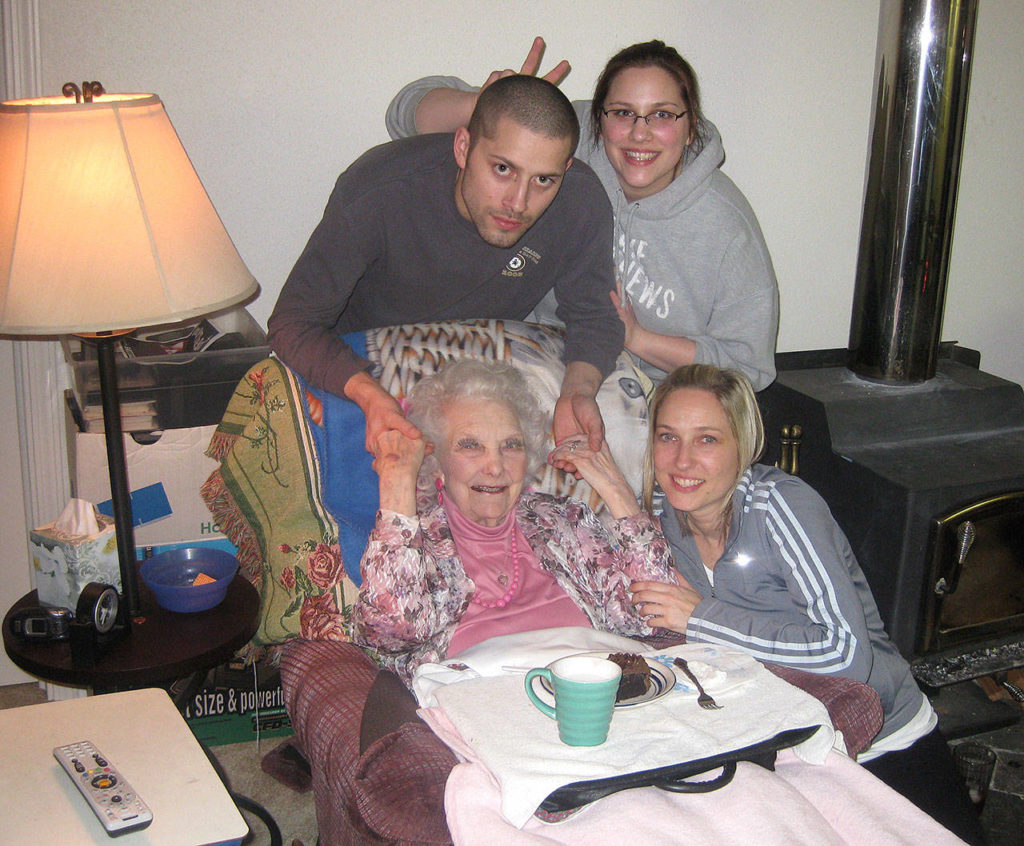MALTBY — In 18 minutes, a young man lost his life.
Alex Dold swung open his front door late one night in March 2017. Men in uniform stood on the porch. One had his gun drawn.
They wanted to come inside to check on his mother, whom they worried was in danger. She had called police that night after an assault that left her with a fat lip.
She wanted officers to take Alex to the hospital. He would be safe there.
The 29-year-old had been diagnosed with paranoid schizophrenia a decade earlier. He hadn’t taken his medication for two months.
His family believes he didn’t understand why officers pushed into the home’s entry way.
Before the 18 minutes were over, he fought with six officers. It was struggle that moved throughout the house, outside onto a porch and down the stairs.
When they finally locked the handcuffs, Alex’s heart stopped.
Police and mental health
Alex’s death adds to a national conversation about how police interact with people living with mental illness.
The combination of mental illness and a physical struggle can be deadly. Weapons that aren’t designed to be lethal — in this case an electric stun gun — can become a factor in someone’s death. Deputies tried to shock Dold at least seven times, reportedly with little effect, records show.
Law enforcement leaders have focused attention on training staff to better help people experiencing a psychotic break.
“They go in between the worlds of what’s true and what’s not. How can you decipher when your brain is playing tricks on you?” Alex’s sister, Jen Dold, said.
A state law that passed in 2015 requires all police officers to complete eight hours of crisis intervention training by 2021. It encourages departments to offer education opportunities beyond that.
The Everett Police Department was the second agency in the state to require its officers to complete a 40-hour class. They are taught to recognize symptoms and develop communication skills to de-escalate crisis situations.
A couple of years after Alex’s diagnosis, Jen joined the National Alliance on Mental Illness as a teacher. The 41-year-old now serves on the board. She said she talks with other families who are afraid to contact police when their loved ones need medical attention.
Oftentimes, they don’t know who else to call.
Hanging out with Hoss
Alex spent many days walking along the Edmonds Marina.
There he met a bulky, tough-looking dog named Hoss who lived on a boat with his owner.
Jen recalls Alex talking about their introduction. The dog “looks so scary, but when you get up close, he’s so soft,” he said.
He would return to the marina looking for Hoss. Every time, the dog came running to greet him. Alex also was known by friends as a gentle giant, at 220 pounds and standing more than 6 feet tall.
He gave back to others, even if all he could offer was kindness.
He drove a veteran home one day after they crossed paths at the Social Security office.
The man didn’t know how he was going to get back to Edmonds. Alex said he was heading that way and insisted the man tag along.
He was quick at math. For several years, he worked as a card dealer in a Shoreline casino.
Alex also had a knack for picking up languages.
He would sit down in a Vietnamese restaurant and by the time he finished eating, he would have learned several new phrases.
Alex also taught himself Spanish and Hungarian. He would practice by talking with his cousins in Hungary. He was curious about far-off places. He planned to travel and go away to college or culinary school. Jen would catch him researching schools in New York.
He played pick-up soccer games at an indoor arena in Snohomish. After matches, he liked to walk down the road to the Pilchuck Drive-in.
He had a straight shot. It secured him a spot playing forward in a highly competitive soccer academy. Jen believes he may have played professionally if he hadn’t gotten sick.
His three older siblings looked after Alex, throughout his childhood and when mental illness claimed him.
The diagnosis
Alex believed people were listening.
Not long after he graduated from high school, he began thinking his home had been wired. He hung blankets over the windows and hid inside.
His anxiety came in waves.
Jen could tell when he wasn’t feeling like himself. His smile was replaced by a blank stare.
A doctor diagnosed his illness when he was 19. Alex and his family joined support groups with others who were learning to navigate the same challenges. He was given medication that curbed his symptoms but didn’t stop him from slipping into psychosis five years later.
His family sought help. Jen remembers sleeping on the floor in an emergency room next to Alex while they waited 15 hours to see a doctor. Each time, they were told nothing could be done. He was ill but not an imminent threat to himself or others.
When Alex was 27, he took off in his car and planned to live out of the backseat. It was 90 degrees and he didn’t bring water. He was admitted into the hospital later that day. A handful of visits followed in the next two years.
He didn’t understand why he was there, Jen said. His stays ranged from a couple of days to three weeks. He got to know people staying on his floor. He wandered into their rooms to ask how they were doing. In their free time, they kicked a soccer ball around.
Jen became his primary caregiver. They visited an Edmonds dog park a few times a week. She took Alex out to lunch and invited him along on outings with her friends. The responsibility of caring for someone living with a mental illness often falls to their loved ones.
“You watch them unravel. It’s like watching your loved one die of cancer for 10 years,” Jen said.
Alex had difficulties recalling if he had taken his pills. Some days, he couldn’t remember how to brush his teeth.
Though he never talked about it, Alex heard voices. He put on headphones and drowned them out with songs by Cher and Tupac. Other times he would leave the room.
Jen got Alex into an intensive outpatient program. He was assigned a case manager to help with day-to-day activities, such as grocery shopping. The person also could accompany him to monthly medical appointments where he received an injection, instead of pills.
His family managed money that he received from the state in disability payments. They didn’t want him to spend too much at once.
“He thought we were controlling him and not letting him live his life. I could see how that would be frustrating,” Jen said. “At the same time, I don’t think he realized how much help he needed.”
Alex didn’t receive his medication for at least the final two months of his life.
An opportunity
She told 911 dispatchers her son had crossed a line.
She had a fat lip. That happened when Alex and his mother wrestled over the phone, and it smacked her in the face. He also reportedly pulled a lanyard off his mother’s neck, flipping the recliner she was sitting in. He wanted the small purse at the end of the lanyard, which contained his money.
She wouldn’t give him $20. His family said he hadn’t been violent before.
The family called crisis lines asking for advice. Jen contacted a friend in law enforcement, asking if there were a couple of officers he trusted to talk with Alex.
The family mulled over options. They ultimately decided to call 911, hoping paramedics would involuntarily commit Alex. They had reached out to police before and the officers persuaded him to go. They knew it could be done.
“We didn’t want him to turn into someone he’s not,” Jen said. “It was our opportunity to get him help.”
His mother told dispatchers Alex had calmed down. The call lasted nearly 10 minutes.
Police arrived at the home on 221st Street SE at 9:47 p.m. The mother and son were watching “Jeopardy” on the couch.
Two Snohomish County sheriff’s deputies stood on the porch. One had drawn his gun. Alex opened the door.
“He didn’t know what was going on. It’s dark and you have two people outside and you don’t know why they’re there,” Jen said.
The deputies forced their way in when Alex tried to close the door. Later, they wrote in reports that they could see a woman who looked frightened inside.
‘Send us some help’
The struggle lasted 18 minutes. It began at the front door, moved into a bedroom and eventually continued outside on the steps leading off the porch.
There was punching, kicking and hitting with a flashlight and a baton. In that time, officers used electronic stun guns seven times. They recalled in their reports that the shocks seemed to have no effect. One deputy wrote that he considered using his firearm. Then he saw Alex’s mother standing behind her son.
“Send us some help,” the deputies broadcast over their police radios. Officers from the Monroe Police Department joined other deputies in racing to the scene.
At one point, a deputy managed to maneuver Alex into a choke hold, trying to make him pass out. The young man carried him on his back.
Reports say he reached for the officer’s gun before he fell unconscious. He woke shortly after. He was lying face-down on the front steps. The struggle resumed as the police tried to handcuff him.
Alex’s mother, who was on the phone with Jen, told him to stop resisting. She asked the deputies to stop using force. She said her son lived with schizophrenia and didn’t understand. Jen listened to the shouts and pulsing sounds made by the stun guns. Neighbors heard Alex calling for his mother.
At 10 p.m., more officers and a sergeant arrived. Alex was in custody five minutes later.
He stopped breathing. There was no pulse. Alex’s family has concerns about how police responded to the emergency. Regardless, life-saving measures proved ineffective.
The sergeant at the scene later recalled that the deputies who’d fought Alex the longest were spent. He’d never seen people so exhausted. It reminded him of a time he was swimming in California. He was caught in a big surf and had to swim his way to safety.
“I literally was so tired gettin’ pounded (by the surf) that I washed up to the shore and just laid there in exhaustion ‘cause I thought I was gonna die,” he said later during an interview with investigators.
Differing accounts
A team of detectives concluded a months-long investigation into Alex’s death.
They are part of a task force that investigates cases where police force results in a fatality or injury. The detectives are selected from agencies around Snohomish County.
Snohomish County Prosecuting Attorney Mark Roe wrote in an October letter that Alex’s death “cannot be attributed to any improper actions by police.” He determined the officers didn’t commit any crimes.
The Snohomish County medical examiner said an autopsy showed Alex died from heart problems. His death was ruled an accident. Contributing factors included schizophrenia and the fight with police that included the use of stun guns. At the same time, the medical examiner concluded the level of force used was “generally not considered to be life-threatening,” reports say.
The Dold family plans to file a wrongful death lawsuit. They dispute some of the officers’ accounts.
“I just want the truth and changes so that other families don’t go through this,” Jen said. “He got killed because he was sick. That’s not fair.”
A year later
Alex’s nephew, Leon, was 2 weeks old the night of the fatal fight. His mother, Vanessa Dold, thinks the two would have been close.
The baby clumsily kicks a small soccer ball around. It is his favorite toy.
“It makes me cry whenever I see that,” she said.
She and Jen now share a home near Edmonds. Jen was previously living in Seattle. After Alex died, she was spending almost all of her time in Snohomish County.
It still is strange realizing Alex won’t stop by for visit, as he often did, Jen said. He loved when everyone was together.
Jen remembers a family trip to Hat Island about five years ago. They rented a cabin where they competed in board games. They rode four-wheelers and played rounds of golf.
Alex had hoped to buy a house there one day so the whole family could be together.
Talk to us
> Give us your news tips.
> Send us a letter to the editor.
> More Herald contact information.



























